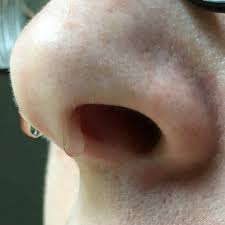 Cerebrospinal fluid rhinorrhea
Cerebrospinal fluid rhinorrhea
Cerebrospinal fluid rhinorrhea (CSF rhinorrhea) refers to the drainage of cerebrospinal fluid through the nose.
It appears as a clear, colourless liquid.
It is typically caused by a basilar skull fracture.
It may be diagnosed using brain imaging studies and by testing to see if discharge from the nose is cerebrospinal fluid.
Treatment may be conservative as many cases resolve spontaneously.
Usually treatment involves neurosurgery.
Symptoms are clear, colorless liquid draining from nose.
Complications of CSF rhinorrhea include infection.
CSF rhinorrhea may be spontaneous, traumatic, or congenital.
Traumatic CSF rhinorrhea is the most common type of CSF rhinorrhea.
Traumatic CSF rhinorrhea may be due to severe head injury, or from complications from neurosurgery.
Spontaneous CSF rhinorrhoea is the most common acquired defect in the skull base bones that causes spontaneous nasal liquorrhea.
Defects are often localized in the sphenoid bone and the ethmoid bone:
sphenoid sinus (43%)
ethmoid bone (29%)
cribriform plate (29%).
Congenital CSF rhinorrhoea is the least common type of CSF rhinorrhea.
Aldroubi sign: The liquid in CSF rhinorrhea is thin and clear, sweet or salty taste due to the increased glucose and electrolytes affects toddlers and young children tend to lick their nose frequently.
CSF rhinorrhea may be a sign of a basilar skull fracture.
The communication between the nasal cavity, the cerebrospinal fluid and the central nervous system can result in bacterial infections.
CSF rhinorrhea may be a complication of neurosurgery: endoscopic sinus surgery, and hypophysectomy.
CSF rhinorrhea may be caused by pituitary adenoma, congenital problems with bones of the skull, or inflammation that damages the bones of the skull.
CSF findings are neither sensitive nor specific for diagnosis.
Beta-2 transferrin has a high positive predictive value of the presence of CSF rhinorrhea.
Neurosurgery by minimally invasive techniques to prevent the spread of infection to the meninges is usually required.
Conservative management is a possibility, as some minor CSF leaks often stop spontaneously.
